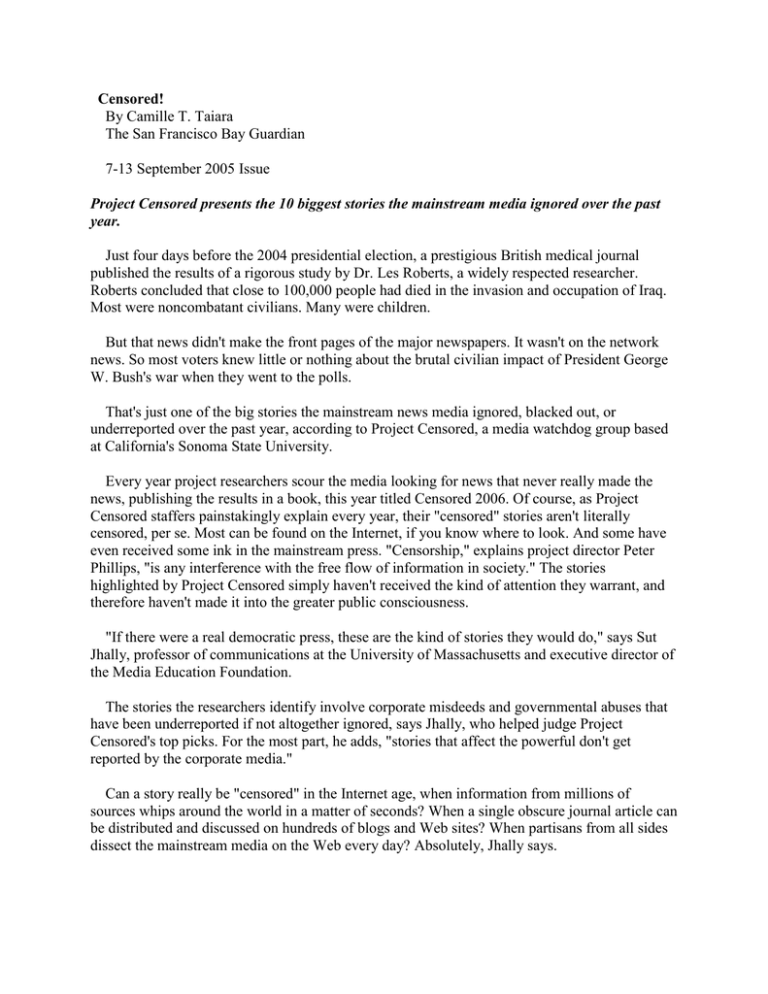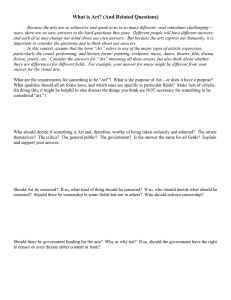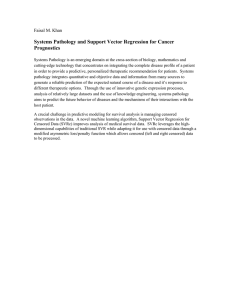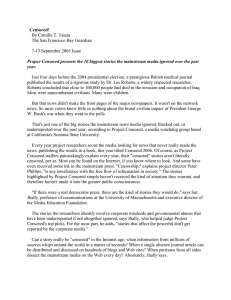Censored! By Camille T. Taiara The San Francisco Bay Guardian
advertisement

Censored! By Camille T. Taiara The San Francisco Bay Guardian 7-13 September 2005 Issue Project Censored presents the 10 biggest stories the mainstream media ignored over the past year. Just four days before the 2004 presidential election, a prestigious British medical journal published the results of a rigorous study by Dr. Les Roberts, a widely respected researcher. Roberts concluded that close to 100,000 people had died in the invasion and occupation of Iraq. Most were noncombatant civilians. Many were children. But that news didn't make the front pages of the major newspapers. It wasn't on the network news. So most voters knew little or nothing about the brutal civilian impact of President George W. Bush's war when they went to the polls. That's just one of the big stories the mainstream news media ignored, blacked out, or underreported over the past year, according to Project Censored, a media watchdog group based at California's Sonoma State University. Every year project researchers scour the media looking for news that never really made the news, publishing the results in a book, this year titled Censored 2006. Of course, as Project Censored staffers painstakingly explain every year, their "censored" stories aren't literally censored, per se. Most can be found on the Internet, if you know where to look. And some have even received some ink in the mainstream press. "Censorship," explains project director Peter Phillips, "is any interference with the free flow of information in society." The stories highlighted by Project Censored simply haven't received the kind of attention they warrant, and therefore haven't made it into the greater public consciousness. "If there were a real democratic press, these are the kind of stories they would do," says Sut Jhally, professor of communications at the University of Massachusetts and executive director of the Media Education Foundation. The stories the researchers identify involve corporate misdeeds and governmental abuses that have been underreported if not altogether ignored, says Jhally, who helped judge Project Censored's top picks. For the most part, he adds, "stories that affect the powerful don't get reported by the corporate media." Can a story really be "censored" in the Internet age, when information from millions of sources whips around the world in a matter of seconds? When a single obscure journal article can be distributed and discussed on hundreds of blogs and Web sites? When partisans from all sides dissect the mainstream media on the Web every day? Absolutely, Jhally says. "The Internet is a great place to go if you already know that the mainstream media is heavily biased" and you actively search out sites on the outer limits of the Web, he notes. "Otherwise, it's just another place where they try to sell you stuff. The challenge for a democratic society is how to get vital information not only at the margins but at the center of our culture." Not every article or source Project Censored has cited over the years is completely credible; at least one this year is pretty shaky. But most of the stories that made the project's top 10 were published by more reliable sources and included only verifiable information. And Project Censored's overall findings provide valuable insights into the kinds of issues the mainstream media should be paying closer attention to. Material Below comes from Project Censored Website. #6 The Real Oil for Food Scam Sources: Harper’s Magazine, December 2004 Title: “The UN is Us: Exposing Saddam Hussein’s silent partner” Author: Joy Gordon http://www.harpers.org/TheUNisUS.html Independent/UK, December 12, 2004 Title: “The oil for Food ‘Scandal’ is a Cynical Smokescreen” Author: Scott Ritter http://www.commondreams.org/views04/1212-23.htm Faculty Evaluator: Robert McNamara, Ph. D. Student Researcher: Deanna Murrell The U.S. has accused UN officials of corruption in Iraq’s oil for food program. According to Joy Gordon and Scott Ritter the charge was actually an attempt to disguise and cover up long term U.S. government complicity in this corruption. Ritter says, “this posturing is nothing more than a hypocritical charade, designed to shift attention away from the debacle of George Bush’s selfmade quagmire in Iraq, and legitimize the invasion of Iraq by using Iraqi corruption and not the now-missing weapons of mass destruction, as the excuse.” Gordon arrives at the conclusion that, “perhaps it is unsurprising that today the only role its seems the United States expects the UN to play in the continuing drama of Iraq is that of scapegoat.” According to Gordon the charges laid by the U.S. accounting office are bogus. There is plenty of evidence of corruption in the “oil-for-food” program, but the trail of evidence leads not to the UN but to the U.S. “The fifteen members of the Security Council—of which the United States was by far the most influential—determined how income from oil proceeds would be handled, and what the funds could be used for.” Contrary to popular understanding, the Security Council is not the same thing as the UN. It is part of it, but operates largely independently of the larger body. The UN’s personnel “simply executed the program that was designed by the members of the Security Council.” The claim in the corporate media was that the UN allowed Saddam Hussein to steal billions of dollars from oil sales. If we look, as Gordon does, at who actually had control over the oil and who’s hands held the money, a very different picture emerges. “If Hussain did indeed smuggle $6 billion worth of oil in the ‘the richest rip off in world history,’ he didn’t do it with the complicity of the UN. He did it on the watch of the U.S. Navy.” explains Gordon. Every monetary transaction was approved by the U.S. through its dominant role on the Security Council. Ritter explains, “the Americans were able to authorize a $1 billion exemption concerning the export of Iraqi oil for Jordan, as well as legitimize the billion-dollar illegal oil smuggling trade over the Turkish border.” In another instance, a Russian oil company “bought oil from Iraq under ‘oil for food’ at a heavy discount, and then sold it at full market value to primarily U.S. companies, splitting the difference evenly between [the Russian company] and the Iraqis. This U.S. sponsored deal resulted in profits of hundreds of millions of dollars for both the Russians and the Iraqis, outside the control of ‘oil for food.’ It has been estimated that 80 percent of the oil illegally smuggled out of Iraq under ‘oil for food’ ended up in the United States.” Not only were criminals enriched in this nefarious scheme, it also ended up sabotaging the original purpose of “oil for food.” Gordon explains, “How Iraq sold its oil was also under scrutiny, and the United States did act on what it perceived to be skimming by Hussain in these deals. The solution that it enacted, however, succeeded in almost bankrupting the entire Oil for Food Program within months.” Harebrained Security Council policy not only succeeded in enriching the dishonest, it also virtually destroyed the program. According to Gordon, the U.S. and UK attempted to prevent kickbacks resulting from artificially low prices: “Instead of approving prices at the beginning of each sales period (usually a month), in accordance with normal commercial practices, the two allies would simply withhold their approval [of the price] until after the oil was sold—creating a bizarre scenario in which buyers had to sign contracts without knowing what the price would be.” The result was “oil sales collapsed by forty percent, and along with them the funds for critical humanitarian imports.” What we have here, according to Gordon and Ritter, is a bare-faced attempt by criminals to shift blame to the innocent. Gordon concludes, “Little of the blame can credibly be laid at the feet of ‘the UN bureaucracy.’ Far more of the fault lies with policies and decisions of the Security Council in which the United States played a central role.” Update by Joy Gordon: The accusations against the Oil for Food Program have served as a springboard for general attacks on the credibility of the United Nations as a whole, as well as personal attacks on Kofi Annan. For the most part the mainstream media has seized on the accusations and repeated them, without doing any of the research that would give the discussion more integrity. For example, “the United Nations” is criticized for “its” failures, and the Secretary General is then blamed because these events “happened on his watch.” What was not mentioned at all for the first year of media coverage is that “the UN” is made up of several different parts, and that the part that designed and oversaw the Oil for Food Program was the Security Council, whose decisions cannot be overridden or modified in any way by the Secretary General. Not only that, while the most vitriolic accusations against the UN have come from the United States, the U.S. is in fact the most dominant member of the Security Council. The U.S. agreed to all the decisions and procedures of the Oil for Food Program that are now being so harshly criticized as “failures of the United Nations.” The mainstream press, for the most part, has repeated that the Oil for Food Program lacked accountability, oversight, or transparency. What is most striking about this is that the elaborate structure of oversight that was in fact in place—and is never mentioned at all—is so easily available. It is on the program’s web site in complete detail along with huge amounts of information, making the program in fact highly transparent. Yet the mainstream press coverage reflects none of this. Last fall we saw the beginnings of some acknowledgement of the U.S. responsibility for Iraq’s ongoing smuggling, as some Democrats introduced evidence in hearings that all three U.S. administrations knew of and supported Iraq’s illicit trade with Jordan and Turkey, two key U.S. allies. The press picked that up, but little else. Since my article came out, there has been a good deal of press coverage from public radio stations and from foreign press. In addition, I have testified twice before Congressional committees, where the members of Congress were incredulous to hear that in fact the program operated very differently than they had been told—even though the information I provided them was obvious, basic, publicly available, and easily accessible. For additional information: Organizations actively addressing these issues include the UN Association and the UN Foundation. Information about the accusations against the program can be found at the following sites: http://www.oilforfoodfacts.org/ UN web site on Oil for Food program: http://www.un.org/Depts/oip/ The Volcker Committee investigating the accusations: http://www.iic-offp.org/



